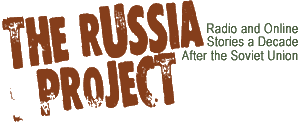Promotional Materials
Logos
High-resolution images for stations airing the Russia Project documentaries are available here, free of charge. Attribution in promotional materials must be made to the Russia Project.
 |
The Russia Project logo black and white (129 KB) |
 |
The Russia Project logo color (2,260 KB) |
 |
Host Walter Cronkite with producer Reese Erlich (335 KB) |
 |
The Stanley Foundation logo (56 KB) |
| KQED Radio logo (32 KB) |
|
| Ken Mills Agency logo (13 KB) |
|
| Download all of the graphics as a single zip file (323KB). | |
Press Release
(Headline)
WALTER CRONKITE TO HOST DOCUMENTARIES ABOUT RUSSIA ON (station)
(Sub Headline)
PROGRAMS OFFER IN-DEPTH LOOK TEN YEARS AFTER THE COLLAPSE OF THE SOVIET UNION.
(Date)
(City, State)
(contact info)
Will Russia become one of America's most important allies in the war against terrorism? What is life like in today's Russia? What has happened to former Soviet dissidents and communists?
These and other key questions about Russia are explored in depth on two public radio documentaries, part of the Russia Project, that will air on (station). Veteran CBS Evening News anchor Walter Cronkite hosts both documentaries.
(station) will join with public radio stations nationwide and international broadcasters airing these special programs.
The one-hour documentary "Russia: Can This Be Democracy?" will air (date & time) on (station).
In this program Walter Cronkite hosts correspondents' reports on the role of hard-line Islamic political forces in Chechnya, looming nuclear and environmental disasters, chaos in the Russian military, the fate of Soviet dissidents, and how some in Russia are cloning the extremes of American culture. Also, Cronkite and Russian journalist Vladimir Pozner compare press freedom in Russia and the United States.
The one-hour documentary "Russia: Ten Years After the Soviet Collapse" will air (date & time) on (station).
Listeners will meet five ordinary Russians today whom producer Reese Erlich interviewed in 1990 and learn how their lives have paralleled the achievements and disasters of the new Russia. Walter Cronkite hosts and reflects on his years as a foreign correspondent in Moscow.
The two documentaries are part of the Russia Project, a radio and Internet project made possible by the Stanley Foundation. The project Web site is located at russiaproject.org.
Bay-area journalist Reese Erlich, in association with KQED Public Radio, San Francisco, produced the radio documentaries.
The Stanley Foundation previously made possible the Iran Project, a public radio documentary and Internet initiative. The foundation also made possible the NPR/American RadioWorks'™ documentary "Revisiting Vietnam."
The foundation also produces Common Ground, radio's weekly program on world affairs, and publishes World Press Review, the only English-language monthly magazine focusing on global issues through the prism of the international press. Learn more about the foundation at www.stanleyfoundation.org.
KQED Public Radio, San Francisco, is one of the nation's leading public radio stations. Learn more about KQED Public Radio at www.kqed.org/pressroom.
The Ken Mills Agency (KMA) is distributing the documentaries worldwide. For more information about KMA, go to www.kenmillsagency.com.
Program Guide Article
(Headline)
WALTER CRONKITE TO HOST DOCUMENTARIES ABOUT RUSSIA ON (station)
(Sub Headline)
PROGRAMS OFFER IN-DEPTH LOOK TEN YEARS AFTER THE COLLAPSE OF THE SOVIET UNION.
Will Russia become one of America's most important allies in the war against terrorism? What is life like in today's Russia? What has happened to former Soviet dissidents and communists?
These and other key questions about Russia are explored in depth in two public radio documentaries, part of the Russia Project, that will air on (station). Veteran CBS Evening News anchor Walter Cronkite hosts both documentaries.
(station) will join with public radio stations nationwide and international broadcasters airing these special programs.
The one-hour documentary "Russia: Can This Be Democracy?" will air (date & time) on (station).
In this program Walter Cronkite hosts correspondents' reports on the role of hard-line Islamic political forces in Chechnya, looming nuclear and environmental disasters, chaos in the Russian military, the fate of Soviet dissidents, and how some in Russia are cloning the extremes of American culture. Also, Cronkite and Russian journalist Vladimir Pozner compare press freedom in Russia and the United States.
The one-hour documentary "Russia: Ten Years After the Soviet Collapse" will air (date & time) on (station).
Listeners will meet five ordinary Russians today whom producer Reese Erlich interviewed in 1990 and learn how their lives have paralleled the achievements and disasters of the new Russia. Walter Cronkite hosts and reflects on his years as a foreign correspondent in Moscow.
The two documentaries are part of the Russia Project, a radio and Internet project made possible by the Stanley Foundation. The project Web site is located at russiaproject.org.
Bay-area journalist Reese Erlich, in association with KQED Public Radio, San Francisco, produced the radio documentaries.
The Stanley Foundation previously made possible the Iran Project, a public radio documentary and Internet initiative. The foundation also made possible the NPR/American RadioWorks'™ documentary "Revisiting Vietnam."
The foundation also produces Common Ground, radio's weekly program on world affairs, and publishes World Press Review, the only English-language monthly magazine focusing on global issues through the prism of the international press. Learn more about the foundation at www.stanleyfoundation.org.
KQED Public Radio, San Francisco, is one of the nation's leading public radio stations. Learn more about KQED Public Radio at www.kqed.org/pressroom.
The Ken Mills Agency (KMA) is distributing the documentaries worldwide. For more information about KMA, go to www.kenmillsagency.com.
| © 2001 by The Stanley Foundation Home | Contact Us | Credits | Privacy Policy | Terms of Use |
